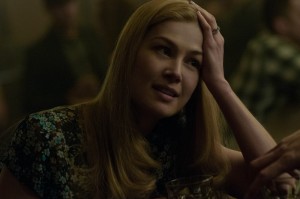Gripping from first frame to last, David Fincher’s “Gone Girl,” his adaptation of Gillian Flynn’s 2012 mystery novel of the same name, is the best screen version a writer can expect of his or her book.
Grade: A- (**** out of *****)
World-premiering at the New York Film Fest (as opening night, September 26), this eagerly-awaited picture (the most buzzed about this year) will be distributed by Fox on October 3 in wide release. The studio should expect strong critical support, boffo box-office, and Oscar talk for a film that should garner Academy nomination in several categories.
 The budget for “Gone Girl” is much lower (around $50 million) than the budgets of Fincher’s previous films, which should help Fox to easily recoup and make profit on its investment for a film that is already touted as a must-see.
The budget for “Gone Girl” is much lower (around $50 million) than the budgets of Fincher’s previous films, which should help Fox to easily recoup and make profit on its investment for a film that is already touted as a must-see.
Overall, “Gone Girl” is a more fully realized and richly satisfying adaptation than Fincher’s previous film (also a literary adaptation and remake of a Swedish film), “The Girl With the Dragon Tattoo,” which disappointed critics and core fans from an artistic standpoint, though it claimed a global gross of $230 million,
Fincher not only offers an utterly satisfying rendition of the source material, he also manages to make it his own in terms of theme and especially style, thus again demonstrating that he is a genuine auteur as well as the most brilliant filmmaker working in Hollywood today.
I have read the book when it was published but tried to forget all about it, especially the last part (which reveals the mystery behind the disappearance of a young married wife). Though long, two and a half hours, “Gone Girl” is directed at such breezy pace and with such mesmerizing that you succumb to the film and its maker and let them work their spell on you.
 Mainstream Hollywood Cinema does not get better than that: Expertly crafted in all departments, “Gone Girl” is a darkly grim tale with satirical touches, elegantly stylish and yet provocative too in terms of what it says about modern marriages and relationships.
Mainstream Hollywood Cinema does not get better than that: Expertly crafted in all departments, “Gone Girl” is a darkly grim tale with satirical touches, elegantly stylish and yet provocative too in terms of what it says about modern marriages and relationships.
Fincher has always been attuned to the zeitgeist—the mores of the “here and now” in American culture, as his best pictures, “Seven,” “The Fight Club,” “Zodiac,” and “Social Network” have shown.
It’s nearly impossible to discuss “Gone Girl” without giving away crucial elements of the plot, but I’ll try.
 Though framed as a suspenseful mystery thriller, “Gone Girl might have been subtitled “Anatomy of Marriage,” for Flynn and Fincher dissect in an intricate, precise, and nuanced way the very foundations upon which marriages are based: love, sex, trust, friendship. And though the bond between Nick Dunne (Ben Affleck) and wife Amy (Rosamund Pike, in a breakthrough performance) is distinctive and particular, it raises issues that pertain to all marriages, specially, how well do we really know our significant others?
Though framed as a suspenseful mystery thriller, “Gone Girl might have been subtitled “Anatomy of Marriage,” for Flynn and Fincher dissect in an intricate, precise, and nuanced way the very foundations upon which marriages are based: love, sex, trust, friendship. And though the bond between Nick Dunne (Ben Affleck) and wife Amy (Rosamund Pike, in a breakthrough performance) is distinctive and particular, it raises issues that pertain to all marriages, specially, how well do we really know our significant others?
His and Her: “Gone Girl” allows the two sides of the marriage, albeit in a different mode. Nick’s story is enacted, occupying most of the screen time, while Amy’s is expressed in voice-overs and wry, often amusing narration.
Making a striking screenwriting debut, Flynn has streamlined her story, while maintaining, multi-layered, multi-time narrative, with all the twists and turns in her book. With attention to minutiae detail, she presents a portrait of a troubled and complex relationship, offering Fincher a suitable text for his own instinctively dark, incredibly cynical worldview.
 The tale is set in North Carthage, a small Missouri town hit hard by the 2008 financial crisis. The first scene takes place on the Dunnes’ fifth wedding anniversary, a morning in which Amy suddenly disappears from their home.
The tale is set in North Carthage, a small Missouri town hit hard by the 2008 financial crisis. The first scene takes place on the Dunnes’ fifth wedding anniversary, a morning in which Amy suddenly disappears from their home.
Nick claims to be clueless about the mysterious, inexplicable vanishing of his wife, but he can’t convince detective Rhonda Boney (Kim Dickens), whose investigation of his personal life points to all kinds of problems in the Dunnes’ marriage. Soon, Nick becomes suspect, and the fact that he doesn’t show overtly strong grief by standards of dominant culture) over his loss makes him all the more culpable. Thus, Ellen Abbott (Missi Pyle) leads the charge against him.
For help, Nick turns to his tough twin sister, Margo (Carrie Coon), who coaches him, and also seeks a high-powered defense attorney, Tanner Bolt (Tyler Perry, cast against type).
Though she largely appears in flashbacks, which depict a much happier youth, Amy remains a strong screen presence throughout the saga, a combined result of the tale’s consistently ominous and threatening tone, and also the strong impact of the performance rendered by the stunningly-looking Rosamund Pike, who had never before been cast in such a leading and meaty part.
We learn that the couple hails from different social background which, at first, physical attraction and love seem to overcome. Nick is a working-class Midwesterner, whereas Amy is from a rich and educated New York family. After their blissful first encounter, they get married in Manhattan. When they both get laid off from their respective writing jobs, they relocate to Nick’s Missouri hometown, where he sinks into despair and depression.
Throughout Fincher tries to balance a rather bleak portrait of one modern marriage that’s gone awry with a sharp satire of our times as defined by tabloid sensationalism.












